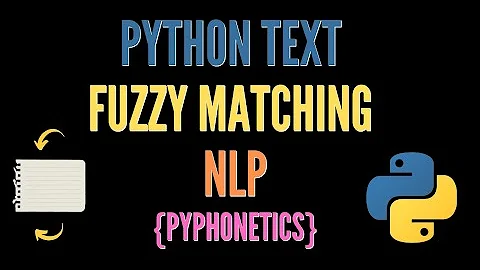Algorithms for "fuzzy matching" strings
Solution 1
I've finally understood what you were looking for. The issue is interesting however looking at the 2 algorithms you found it seems that people have widely different opinions about the specifications ;)
I think it would be useful to state the problem and the requirements more clearly.
Problem:
We are looking for a way to speed up typing by allowing users to only type a few letters of the keyword they actually intended and propose them a list from which to select.
- It is expected that all the letters of the input be in the keyword
- It is expected that the letters in the input be in the same order in the keyword
- The list of keywords returned should be presented in a consistent (reproductible) order
- The algorithm should be case insensitive
Analysis:
The first two requirements can be sum up like such: for an input axg we are looking for words matching this regular expression [^a]*a[^x]*x[^g]*g.*
The third requirement is purposely loose. The order in which the words should appear in the list need being consistent... however it's difficult to guess whether a scoring approach would be better than alphabetical order. If the list is extremy long, then a scoring approach could be better, however for short list it's easier for the eye to look for a particular item down a list sorted in an obvious manner.
Also, the alphabetical order has the advantage of consistency during typing: ie adding a letter does not completely reorder the list (painful for the eye and brain), it merely filters out the items that do not match any longer.
There is no precision about handling unicode characters, for example is à similar to a or another character altogether ? Since I know of no language that currently uses such characters in their keywords, I'll let it slip for now.
My solution:
For any input, I would build the regular expression expressed earlier. It suitable for Python because the language already features case-insensitive matching.
I would then match my (alphabetically sorted) list of keywords, and output it so filtered.
In pseudo-code:
WORDS = ['Bar', 'Foo', 'FooBar', 'Other']
def GetList(input, words = WORDS):
expr = ['[^' + i + ']*' + i for i in input]
return [w for w in words if re.match(expr, w, re.IGNORECASE)]
I could have used a one-liner but thought it would obscure the code ;)
This solution works very well for incremental situations (ie, when you match as the user type and thus keep rebuilding) because when the user adds a character you can simply refilter the result you just computed. Thus:
- Either there are few characters, thus the matching is quick and the length of the list does not matter much
- Either there are a lots of characters, and this means we are filtering a short list, thus it does not matter too much if the matching takes a bit longer element-wise
I should also note that this regular expression does not involve back-tracking and is thus quite efficient. It could also be modeled as a simple state machine.
Solution 2
Levenshtein 'Edit Distance' algorithms will definitely work on what you're trying to do: they will give you a measurement of how closely two words or addresses or phone numbers, psalms, monologues and scholarly articles match each other, allowing you you rank the results and choose the best match.
A more lightweight appproach is to count up the common substrings: it's not as good as Levenshtein, but it provides usable results and runs quickly in slow languages which have access to fast 'InString' functions.
I published an Excel 'Fuzzy Lookup' in Excellerando a few years ago, using 'FuzzyMatchScore' function that is, as far as I can tell, exactly what you need:
http://excellerando.blogspot.com/2010/03/vlookup-with-fuzzy-matching-to-get.html
It is, of course, in Visual Basic for Applications. Proceed with caution, crucifixes and garlic:
Public Function SumOfCommonStrings( _
ByVal s1 As String, _
ByVal s2 As String, _
Optional Compare As VBA.VbCompareMethod = vbTextCompare, _
Optional iScore As Integer = 0 _
) As Integer
Application.Volatile False
' N.Heffernan 06 June 2006
' THIS CODE IS IN THE PUBLIC DOMAIN
' Function to measure how much of String 1 is made up of substrings found in String 2
' This function uses a modified Longest Common String algorithm.
' Simple LCS algorithms are unduly sensitive to single-letter
' deletions/changes near the midpoint of the test words, eg:
' Wednesday is obviously closer to WedXesday on an edit-distance
' basis than it is to WednesXXX. So it would be better to score
' the 'Wed' as well as the 'esday' and add up the total matched
' Watch out for strings of differing lengths:
'
' SumOfCommonStrings("Wednesday", "WednesXXXday")
'
' This scores the same as:
'
' SumOfCommonStrings("Wednesday", "Wednesday")
'
' So make sure the calling function uses the length of the longest
' string when calculating the degree of similarity from this score.
' This is coded for clarity, not for performance.
Dim arr() As Integer ' Scoring matrix
Dim n As Integer ' length of s1
Dim m As Integer ' length of s2
Dim i As Integer ' start position in s1
Dim j As Integer ' start position in s2
Dim subs1 As String ' a substring of s1
Dim len1 As Integer ' length of subs1
Dim sBefore1 ' documented in the code
Dim sBefore2
Dim sAfter1
Dim sAfter2
Dim s3 As String
SumOfCommonStrings = iScore
n = Len(s1)
m = Len(s2)
If s1 = s2 Then
SumOfCommonStrings = n
Exit Function
End If
If n = 0 Or m = 0 Then
Exit Function
End If
's1 should always be the shorter of the two strings:
If n > m Then
s3 = s2
s2 = s1
s1 = s3
n = Len(s1)
m = Len(s2)
End If
n = Len(s1)
m = Len(s2)
' Special case: s1 is n exact substring of s2
If InStr(1, s2, s1, Compare) Then
SumOfCommonStrings = n
Exit Function
End If
For len1 = n To 1 Step -1
For i = 1 To n - len1 + 1
subs1 = Mid(s1, i, len1)
j = 0
j = InStr(1, s2, subs1, Compare)
If j > 0 Then
' We've found a matching substring...
iScore = iScore + len1
' Now clip out this substring from s1 and s2...
' And search the fragments before and after this excision:
If i > 1 And j > 1 Then
sBefore1 = left(s1, i - 1)
sBefore2 = left(s2, j - 1)
iScore = SumOfCommonStrings(sBefore1, _
sBefore2, _
Compare, _
iScore)
End If
If i + len1 < n And j + len1 < m Then
sAfter1 = right(s1, n + 1 - i - len1)
sAfter2 = right(s2, m + 1 - j - len1)
iScore = SumOfCommonStrings(sAfter1, _
sAfter2, _
Compare, _
iScore)
End If
SumOfCommonStrings = iScore
Exit Function
End If
Next
Next
End Function
Private Function Minimum(ByVal a As Integer, _
ByVal b As Integer, _
ByVal c As Integer) As Integer
Dim min As Integer
min = a
If b < min Then
min = b
End If
If c < min Then
min = c
End If
Minimum = min
End Function
Solution 3
Two algorithms I've found so far:
Solution 4
I'm actually building something similar to Vim's Command-T and ctrlp plugins for Emacs, just for fun. I have just had a productive discussion with some clever workmates about ways to do this most efficiently. The goal is to reduce the number of operations needed to eliminate files that don't match. So we create a nested map, where at the top-level each key is a character that appears somewhere in the search set, mapping to the indices of all the strings in the search set. Each of those indices then maps to a list of character offsets at which that particular character appears in the search string.
In pseudo code, for the strings:
- controller
- model
- view
We'd build a map like this:
{
"c" => {
0 => [0]
},
"o" => {
0 => [1, 5],
1 => [1]
},
"n" => {
0 => [2]
},
"t" => {
0 => [3]
},
"r" => {
0 => [4, 9]
},
"l" => {
0 => [6, 7],
1 => [4]
},
"e" => {
0 => [9],
1 => [3],
2 => [2]
},
"m" => {
1 => [0]
},
"d" => {
1 => [2]
},
"v" => {
2 => [0]
},
"i" => {
2 => [1]
},
"w" => {
2 => [3]
}
}
So now you have a mapping like this:
{
character-1 => {
word-index-1 => [occurrence-1, occurrence-2, occurrence-n, ...],
word-index-n => [ ... ],
...
},
character-n => {
...
},
...
}
Now searching for the string "oe":
- Initialize a new map where the keys will be the indices of strings that match, and the values the offset read through that string so far.
- Consume the first char from the search string "o" and look it up in the lookup table.
- Since strings at indices 0 and 1 match the "o", put them into the map
{0 => 1, 1 => 1}. - Now search consume the next char in the input string, "e" and loo it up in the table.
- Here 3 strings match, but we know that we only care about strings 0 and 1.
- Check if there are any offsets > the current offsets. If not, eliminate the items from our map, otherwise update the offset:
{0 => 9, 1 => 3}.
Now by looking at the keys in our map that we've accumulated, we know which strings matched the fuzzy search.
Ideally, if the search is being performed as the user types, you'll keep track of the accumulated hash of results and pass it back into your search function. I think this will be a lot faster than iterating all search strings and performing a full wildcard search on each one.
The interesting thing about this is that you could also efficient store the Levenstein Distance along with each match, assuming you only care about insertions, not substitutions or deletions. Though perhaps it's not hard to get that logic added too.
Solution 5
I recently had to solve the same problem. My solution involves scoring strings with consecutively matched letters highly and excluding strings that don't contain the typed letters in order.
I've documented the algorithm in detail here: http://blog.kazade.co.uk/2014/10/a-fuzzy-filename-matching-algorithm.html
Related videos on Youtube
Alexey Romanov
A programmer and mathematician. Favorite languages: Haskell, Ruby, C#.
Updated on October 17, 2020Comments
-
Alexey Romanov over 3 years
By fuzzy matching I don't mean similar strings by Levenshtein distance or something similar, but the way it's used in TextMate/Ido/Icicles: given a list of strings, find those which include all characters in the search string, but possibly with other characters between, preferring the best fit.
-
 Matthieu M. almost 14 yearsYour description of the problem is quite fuzzy too. From what I've read about those algorithms the Levenshtein distance would probably work too, it would just be too slow. Perhaps could you describe it better ?
Matthieu M. almost 14 yearsYour description of the problem is quite fuzzy too. From what I've read about those algorithms the Levenshtein distance would probably work too, it would just be too slow. Perhaps could you describe it better ?
-
-
Alexey Romanov almost 14 yearsThis is covered by "I don't mean similar strings by Levenshtein distance or something similar".
-
Emile almost 13 yearsAnother requirement is that the algorithm favors or requires words that match consecutive letters or letters with specific properties such as being uppercase (for camelcase sensitive lookup) or after separators (type edl for Environment.Data.Lookup, or wsd for windows/system32/drivers). This is just an idea, I don't know if this would be comfortable in practice.
-
 Matthieu M. almost 13 years@Emile: This would considerably augment the search space, especially matching on the filesystem would seriously hamper the speed. I think an incremental approach (match first
Matthieu M. almost 13 years@Emile: This would considerably augment the search space, especially matching on the filesystem would seriously hamper the speed. I think an incremental approach (match firstEnvironment, thenData, thenLookup, idem for the filesystem) would probably be sufficient. It means that you have context-sensitive auto-completion though, which is quite more involved and requires full syntax analysis.






